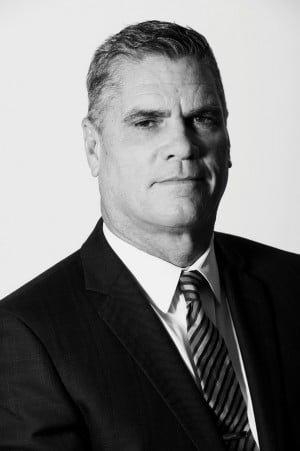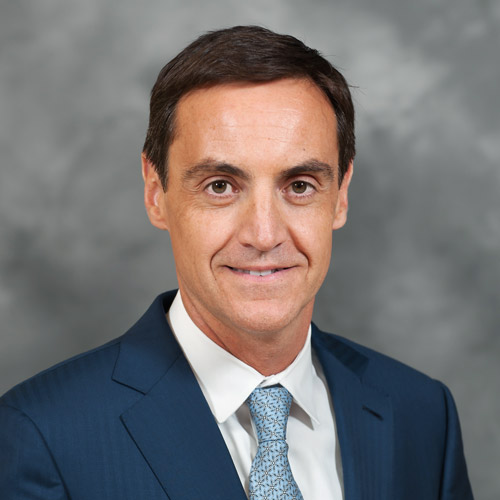Assimilation can sometimes be a loaded term in Latino communities. But for Carlos Aguilera, assimilation does not mean deletion. The Latino experience in the United States is complicated and varied—a fact Aguilera knows better than most. He is Chevron’s vice president and general manager of business development for Africa and Latin America, a role he utilizes to champion the value of diversity.

Upon leaving Cuba when he was four years old—just before the Bay of Pigs Invasion—Aguilera’s family settled in Milwaukee. In seventeen years his father went from an entry-level engineer to president of one of the largest companies in Wisconsin. Watching his father obtain the often-elusive American Dream shaped Aguilera’s work ethic, although his path would take a few unexpected turns. For example, he had a unique opportunity to play high school basketball in Brazil, which eventually led to a spot on the Louisiana State University team. A sports injury took him off the court for good, but set his life on an entirely different trajectory.
After college, he was hired by Chevron, one of America’s most iconic and successful companies, recently ranking third on the Fortune 500 list. The energy company is active in more than 180 countries and engaged in every aspect of the oil, gas, and geothermal energy industries. Much like his father, Aguilera worked his way up the ranks while earning a master’s degree in business administration from MIT with a focus on energy economics and advanced negotiations.
During his almost 35 years with Chevron, Aguilera has lived or spent a substantial amount of time in 11 different countries, and no matter how unfamiliar another culture may be, he has the ability to adapt, a skill he attributes in part to his Latino background. “Nothing teaches you tolerance like living with 17 people in a small, three-bedroom house,” Aguilera laughs, remembering one Christmas family gathering. “Being Latino and coming from a large family means being adaptable, and that’s something Chevron understands and values.” Having been to Angola, China, Russia, and Venezuela during times of crisis, Aguilera is once again able to attribute his adaptability and resilience to his Latino background.
In 2012, more than 25,000 employees were members of Chevron’s employee networks and affinity groups.
Since 2005, Chevron has received a
perfect score on the Human Rights Campaign’s corporate equality index.
In an effort to expand opportunities for minorities by upping its recruitment efforts at historically black colleges and universities, Chevron has made $3 million in donations to schools to support engineering and computer science programs.
Women and minorities accounted for nearly
half of Chevron’s new employees in 2013.
Aguilera consistently draws upon his Latin culture when traveling abroad. Not speaking the native language and being unfamiliar with a new culture might sound like major roadblocks, but coming from a large immigrant family has taught him how to assimilate from both personal and business perspectives. “As a former outsider myself, I know how to navigate, and I enjoy the challenge,” he says. The elements that bring people together (food, music, community, culture, beliefs) are all innately interesting to Aguilera, and he applies them when working abroad.
“I think that’s what Latinos bring to the table,” Aguilera says. “Assimilating does not mean letting go of your language or your culture,” he says, noting a common misconception among young Latinos. Aguilera’s culture has been a tool that has helped him throughout his career. “It’s a pet peeve of mine when talking to young Latinos who don’t speak Spanish. Language and culture are your gifts, your strengths. It’s important not to lose touch with those attributes.”
Perhaps words like “diversity” and “multiculturalism” weren’t being thrown around in his childhood home in Milwaukee, but they were ideas Aguilera absorbed at a very young age. “I remember my father always used to say, ‘Genius has no color, no religion, no gender,’” recalls Aguilera.
Previously, Chevron was only recruiting at top technical college campuses, such as Stanford, Penn State, and Texas A&M. Aguilera, however, knowing that genius has no limits, began reshaping that approach. It was important to him that the company begin seeking those students attending local, state colleges like University of Texas-Pan American and University of Puerto Rico while also working to help support their families. “These kids are true gems,” Aguilera says. “They know what it’s like to work hard. They are dependable. They’re maintaining 3.5 GPAs and taking care of their families at the same time. Why wouldn’t you want these kids working for your organization?”
Chevron seeks diversity within every level of the organization—and it’s not just paying lip service to diversity, either. As a global company, Chevron aims to have its workforce reflect the diverse communities it serves. “The Chevron way,” which is essentially the company’s mission statement, explicitly outlines its commitment to diversity, saying, in part, “We learn from and respect the cultures in which we work. We value and demonstrate respect for the uniqueness of individuals and the varied perspectives and talents they provide. We have an inclusive work environment and actively embrace a diversity of people, ideas, talents, and experiences.”
The business case for diversity is also something Chevron understands. The company does everything in its power to help its employees feel supported, offering a dozen employee affinity groups, each with chapters around the globe. In 2012 alone, more than 25,000 of its employees participated in such programs that provided access to mentoring, employee development, recruitment, community outreach, and cultural awareness. Somos, the Latin American and Hispanic employee network, is particularly popular at Chevron. The affinity group does amazing work in local communities, with a special emphasis on Latino students. Each year, the network provides $1,000 scholarships to high school seniors who demonstrate scholastic achievement, community involvement, and leadership skills.
“We need to keep pushing in terms of education,” he says. “Instead of encouraging Latinas to be nurses, let’s tell them to be doctors. If a young man wants to be a mechanic, let’s encourage him to be an engineer. Chevron is a home for Latinos and we provide great educational opportunities to employees.”
Aguilera hopes more young Latinos choose to enter science, technology, engineering, and math fields and eventually make their way to Chevron. As the country’s demographics continue to shift, he believes they will find a home and an abundance of opportunities at the company. “We operate in so many different countries, and we’re from California, so there is a certain level of natural openness and multiculturalism in our roots,” Aguilera says. “We have almost 300 national Latinos working outside their home countries in Latin America. We have national employees from Venezuela working in Angola and Kazakhstan. These are great opportunities for our employees, but they also make our business strong. We’re mixing the pot and it makes Chevron a beautiful place to work. There is no downside to approaching business in this way.”

